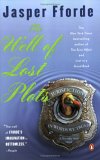Summary | Excerpt | Reading Guide | Reviews | Readalikes | Genres & Themes | Author Bio

A Thursday Next Novel
by Jasper FfordeChapter 1.
The Absence of Breakfast.
The Well of Lost Plots. To understand the Well you have to have an idea of the layout of the Great Library. The library is where all published fiction is stored so it can be read by the readers in the Outland; there are twenty-six floors, one for each letter of the alphabet. The library is constructed in the layout of a cross with the four corridors radiating from the center point. On all the walls, end after end, shelf after shelf, are books. Hundreds, thousands, millions of books. Hardbacks, paperbacks, leatherbound, everything. But the similarity of all these books to the copies we read back home is no more than the similarity a photograph has to its subject; these books are alive.
Beneath the Great Library are twenty-six floors of dingy yet industrious sub-basements known as the Well of Lost Plots. This is where books are constructed, honed and polished in readiness for a place in the library above—if they make it that far. The failure rate is high. Unpublished books outnumber published by an estimated eight to one.
THURSDAY NEXT,
The Jurisfiction Chronicles
MAKING ONE'S HOME in an unpublished novel wasn't without its compensations. All the boring day-to-day mundanities that we conduct in the real world get in the way of narrative flow and are thus generally avoided. The car didn't need refueling, there were never any wrong numbers, there was always enough hot water, and vacuum cleaner bags came in only two sizes—upright and pull along. There were other more subtle differences, too. For instance, no one ever needed to repeat themselves in case you didn't hear, no one shared the same name, talked at the same time or had a word annoyingly "on the tip of their tongue." Best of all, the bad guy was always someone you knew of, and—Chaucer aside—there wasn't much farting. But there were some downsides. The relative absence of breakfast was the first and most notable difference to my daily timetable. Inside books, dinners are often written about and therefore feature frequently, as do lunches and afternoon tea; probably because they offer more opportunities to further the story.
Breakfast wasn't all that was missing. There was a peculiar lack of cinemas, wallpaper, toilets, colors, books, animals, underwear, smells, haircuts, and strangely enough, minor illnesses. If someone was ill in a book, it was either terminal and dramatically unpleasant or a mild head cold—there wasn't much in between.
I was able to take up residence inside fiction by virtue of a scheme entitled the Character Exchange Program. Due to a spate of bored and disgruntled bookpeople escaping from their novels and becoming what we called PageRunners, the authorities set up the scheme to allow characters a change of scenery. In any year there are close to ten thousand exchanges, few of which result in any major plot or dialogue infringements—the reader rarely suspects anything at all. Since I was from the real world and not actually a character at all, the Bellman and Miss Havisham had agreed to let me live inside the BookWorld in exchange for helping out at Jurisfiction—at least as long as my pregnancy would allow.
The choice of book for my self-enforced exile had not been arbitrary; when Miss Havisham asked me in which novel I would care to reside, I had thought long and hard. Robinson Crusoe would have been ideal considering the climate, but there was no one female to exchange with. I could have gone to Pride and Prejudice, but I wasn't wild about high collars, bonnets, corsets—and delicate manners. No, to avoid any complications and reduce the possibility of having to move, I had decided to make my home in a book of such dubious and uneven quality that publication and my subsequent enforced ejection was unlikely in the extreme. I found just such a book deep within the Well of Lost Plots amongst failed attempts at prose and half-finished epics of such dazzling ineptness that they would never see the light of day. The book was a dreary crime thriller set in Reading entitled Caversham Heights. I had planned to stay there for only a year, but it didn't work out that way. Plans with me are like De Floss novels—try as you might, you never know quite how they are going to turn out.
Copyright Jasper Fforde 2003. All rights reserved.
Too often we enjoy the comfort of opinion without the discomfort of thought.
Click Here to find out who said this, as well as discovering other famous literary quotes!
Your guide toexceptional books
BookBrowse seeks out and recommends the best in contemporary fiction and nonfiction—books that not only engage and entertain but also deepen our understanding of ourselves and the world around us.